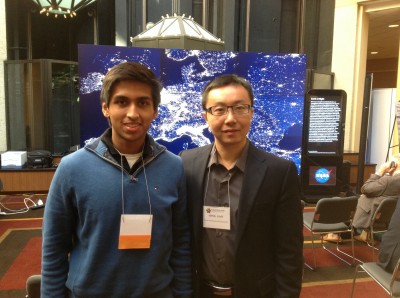NSU Newsroom
SharkBytes
Horizons
This version of NSU News has been archived as of February 28, 2019. To search through archived articles, visit nova.edu/search. To access the new version of NSU News, visit news.nova.edu.
This version of SharkBytes has been archived as of February 28, 2019. To search through archived articles, visit nova.edu/search. To access the new version of SharkBytes, visit sharkbytes.nova.edu.
Professor and Student Contribute to Climate-Change Research and International Policy Making
Sujay Kamisetti, a sophomore biology major at the Farquhar College of Arts and Sciences and member of NSU’s Undergraduate Honors Program, presented at the annual conference of the National Council for Science and the Environment (NCSE) in Washington, D.C.
Under the guidance of Song Gao, Ph.D., associate professor at the college, Kamisetti presented a poster titled “Long-Range Transport and In-Situ Transformation of Atmospheric Aerosols” at the NCSE’s 15th National Conference and Global Forum on Science, Policy and the Environment on January 27–29, 2015, in Washington, D.C. His work was based on the analysis of data collected from the field and lab on aerosol chemistry and transformation in the lower atmosphere.
“Sujay did an excellent job in both presenting and working as one of the nationally selected volunteers for the conference,” Gao said.
“This experience was tremendous,” Kamisetti said. “It truly was an amalgamation of science, the environment, and policy. Real struggles still exist in converting scientific findings to effective policy-making, especially policy-making implemented internationally.
“As a volunteer at this event, I was able to attend many of the informational sessions and gain true insight into the concerns rising from these developing issues,” Kamisetti said.
During the NCSE conference, keynote speeches were delivered by scientists, diplomats and government officials about climate change, renewable energy, and how climate and energy issues will be addressed in future decades.
Gao presented a technical poster titled “Limiting Short-Lived Climate Pollutants in Curbing Climate Change: The Atmospheric Chemistry Perspective,” based on his peer-reviewed paper that is in press and will be publishedin the Journal of Environmental Studies and Sciences.
Gao joins several key architects of an earlier environmental global treaty, the Montreal Protocol, in writing articles about climate science and policy issues for the international journal.
Gao also delivered a talk, “Enhancing the Academics’ Roles in the U.S.-China Climate Change Partnership: Science, Education, and Public Communication,” and participated in the U.S.-China forum on the bilateral climate-change partnership that he helped organize for NCSE.
“Many new ideas and proposals were raised at the conference on how the two largest greenhouse gas emitters–– the United States and China––may lead the world in coping with climate change and resolving energy issuesthat directly impact every nation’s economy and public welfare,” Gao said.
“The difficulty lies in the extremely convoluted nature of the climate issue in regard to the science and also the policy implementation. That is also the excitement of being a researcher in this field. Some of our proposals based on latest research —such as immediately cutting short-lived climate pollutants as a mitigation strategy to curb the current warming trends—hopefully will be considered in the months leading tothe 2015 United Nations Climate Change Conference in Paris, France. There, almost 200 nations will meet to attempt to sign a milestone global agreement on climate change.”
